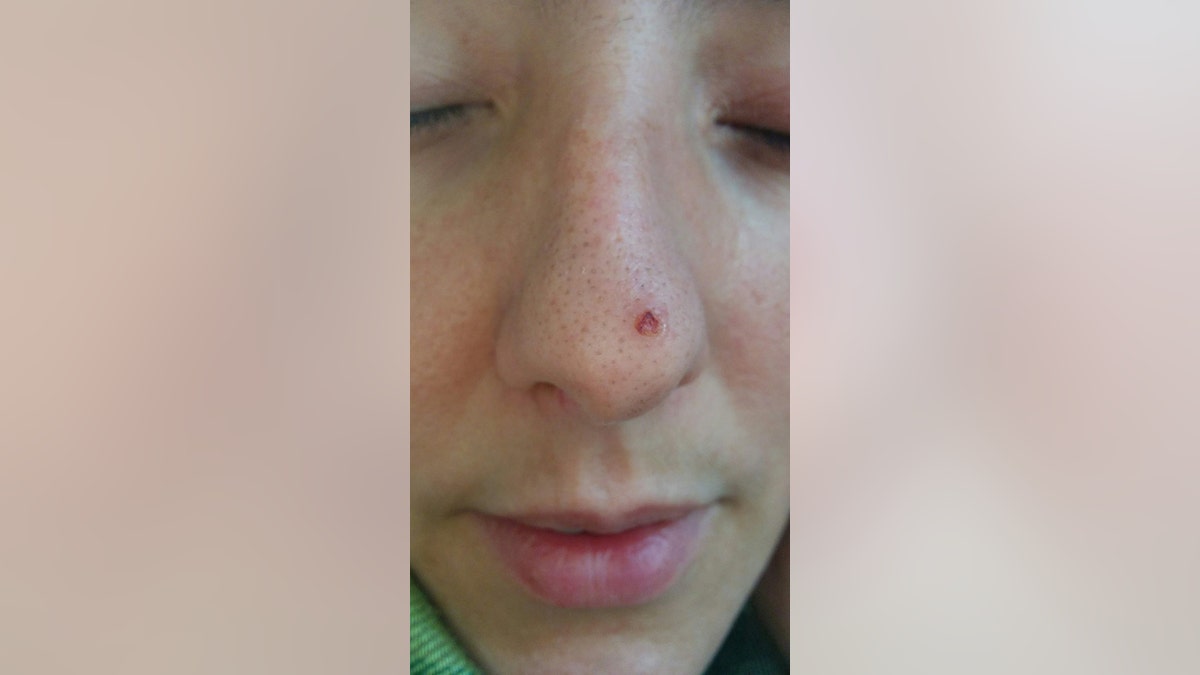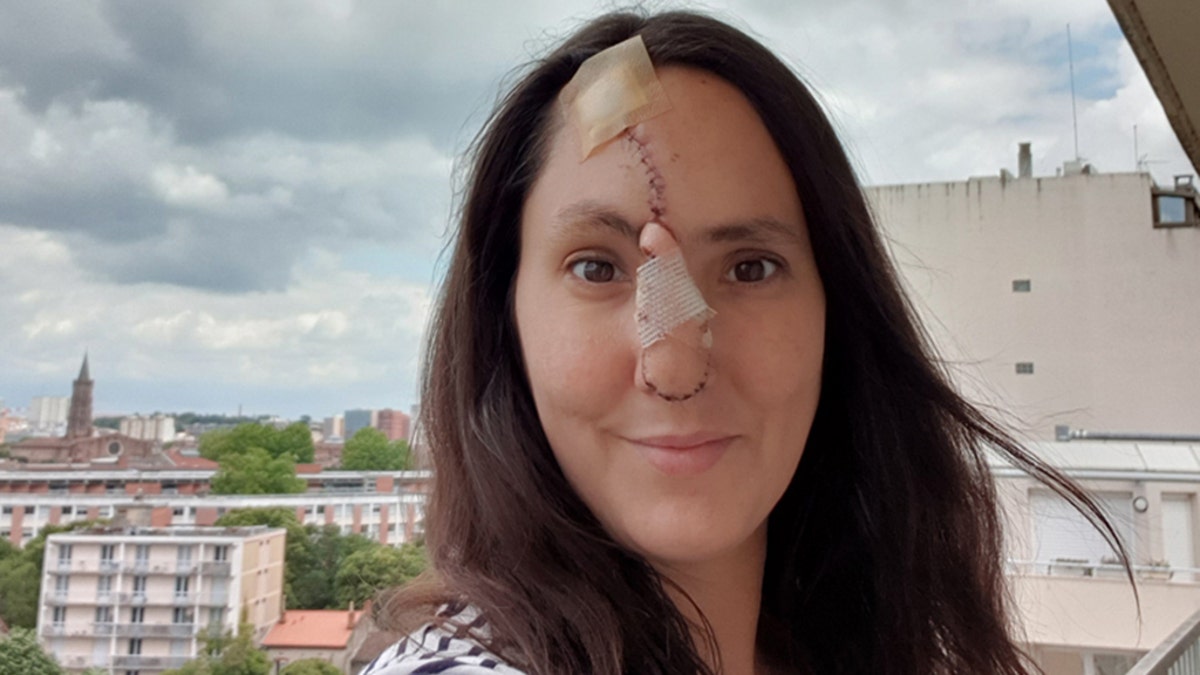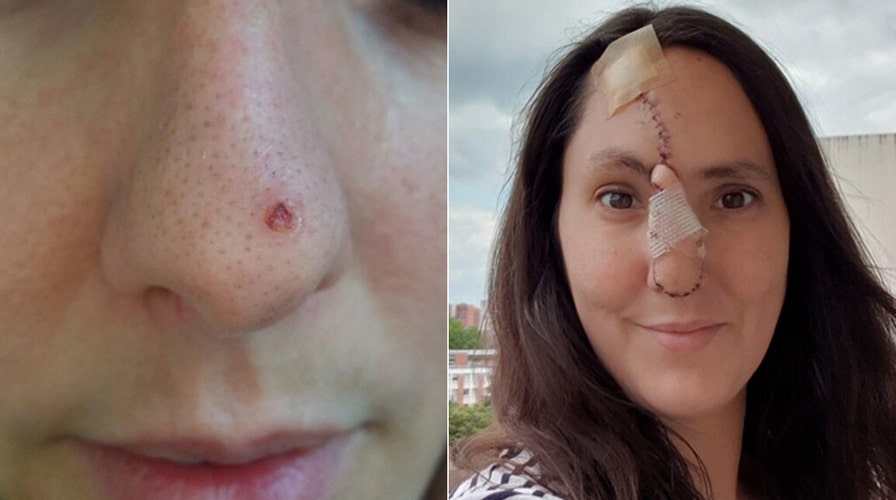Fox News Flash top headlines for June 19
Fox News Flash top headlines for June 19 are here. Check out what's clicking on Foxnews.com
A former sun worshipper who admitted to soaking up the rays without using protection for decades shared how she had the tip of her nose cut off after a pink pimple on the end turned out to be sun-bathing induced skin cancer.
Left with a hole in her nose, which had to be covered using a radical technique known as a reconstructive skin flap, involving three operations in May and June, yoga teacher Laure Seguy, 35, who is married and has a daughter, Ayla-Rose, 3, has now drastically overhauled her relationship with the sun.

Laure Seguy's cancer began as a small spot on the end of her nose that refused to go away . (PA Real Life)
Instead of exposing her bare skin to the high summer temperatures common where she lives in Toulouse in the South of France, Seguy is now avoiding direct sunlight.
EARWAX CLUMP CLOGGING ENTIRE EAR CANAL REMOVED FROM PATIENT: 'LOOK AT THAT!'
"When I was younger, I never used to wear sunscreen and I was in love with the look of having brown, tanned skin," Seguy said. "But now I am so careful about protecting myself from the sun and I wear factor 50 and a hat, because you really don't realize how damaging the sun is, and I never want the same thing to happen ever again."
When she first noticed a small spot on the tip of her nose last summer, Seguy, whose 33-year-old husband, Tom, is a sound engineer, thought little of it, assuming she had scratched it somehow.
Over the coming months, though, the small red mark remained, intermittently bleeding, then scabbing over again - a process that repeated itself several times.
Finally, in Oct. 2018, she decided to tell her doctor about it.
"Initially, the doctor thought it might be bacterial and so put me on a course of anti-bacterial creams," she said. "When they did nothing though, the doctor told me I should see a dermatologist, so I rang up to book an appointment. They told me that the next free slot was not until the following February and asked me what was the problem. I told them I had a spot on my nose that bled every now and then and had been there for five months. I remember hearing a blank on the other end of the line before the dermatologist said, 'OK, we have an appointment for you in 15 days.' That's when I knew it was really serious."

Seguy, pictured seven days after her second surgery which grafted skin from her forehead to her nose. (PA Real Life)
A sun worshipper since childhood, Seguy, who has naturally dark skin, rarely thought to wear sunscreen on vacation or during the sizzling summers where she lives in the South of France.
"I don't have freckles and I have quite tanned skin anyway, so I never really burn, only a little bit sometimes at the start of the summer," she said.
But a biopsy of the pimple in Nov. 2018 revealed that she had basal cell carcinoma - a slow-growing form of non-melanoma skin cancer, making it more common, but less dangerous than melanoma skin cancer, which spreads more quickly to other parts of the body, according to the NHS.
Told she would require surgery to remove the cancerous cells, Seguy decided to wait until the following May for her operation, as she was in the middle of doing a yoga teacher training course in Paris.
"I was obviously a bit concerned about leaving it so long, but the doctors said that because it was very slow growing it was OK to wait," she said.
When May arrived, Seguy had the first of three procedures, cutting 11 millimeters off the end of her nose, removing both cancerous and healthy cells, to make sure all the carcinoma had gone.
A week later, having analyzed the cells, surgeons were confident Seguy was cancer free.
GEORGIA TODDLER DIAGNOSED WITH RARE OVARIAN CANCER NOW DISEASE-FREE
A week later came the second two-hour surgical procedure to cut a piece of skin from her hairline and pull it down, attaching it to a hole in her nose, called a reconstructive skin flap.
Waking up groggy from the general anesthetic, Seguy recalled her shock at seeing her new face, which she said looked "utterly bizarre."
Horribly self-conscious about her strange appearance, she was reluctant to leave the house over the next few weeks, while the transferred skin knitted into her nose.
Then came her final operation, on June 3, with all surgeries taking place at the specialist cancer hospital, the Oncopole de Toulouse - this time to remove the flap which had been feeding the skin graft, by keeping it connected to her bloodstream through a vein running from her forehead to her nose.
She said she will never forget the first time she left the house a week after the second operation.
"I felt really uncomfortable, as for the first time in my life I experienced what it was like for people to stare at you in the street," she said. "Strangers were coming up to me asking if I had been in a terrible accident because my face was so mangled. I looked like a boxer who had been beaten up in the ring."
Luckily, her appearance has now greatly improved, but Seguy said her traumatic experience has made her completely reevaluate her attitude to the sun.
"My face was swollen for a little while after my last procedure, but gradually it got back to normal," she said. "My new nose is certainly much rounder than my old one at the tip and the texture and color is different too. I also have scarring and a bump on my forehead where they pulled the skin flap down."
"It isn't like my old nose, which was quite slim and narrow, but it's a lot better than when I had a skin flap covering my face," she said. "Still, my experience has completely changed my attitude to the sun, which I will have far greater respect for in future."
Seguy's brush with disaster has also reaffirmed what really matters to her and she is now considering a change of career, so she can spend more time with her husband and daughter.
"It has reaffirmed the fact that life is short and currently, in my job as a yoga teacher, I usually work at the evening, which means I don't see my family as much," she said. "So now I want to change path and find work that lets me see my loved ones because really that is all that matters."
Dr. Bav Shergill, consultant dermatologist and British Skin Foundation spokesperson, warned against the danger of exposing unprotected skin to the sun.
CLICK HERE TO GET THE FOX NEWS APP
"Basal cell carcinoma is a non-melanoma skin cancer and it's the most common type of skin cancer, accounting for over 80 percent of all skin cancer cases in the UK," Shergill said. "The commonest cause is too much exposure to UV light from the sun or from sunbeds. BCC can occur anywhere on your body, but is most common on areas that are often exposed to the sun."
"It’s always important to protect your skin from the sun’s harmful UV rays," Shergill said. "As many as four out of every five cases of skin cancer are preventable."

